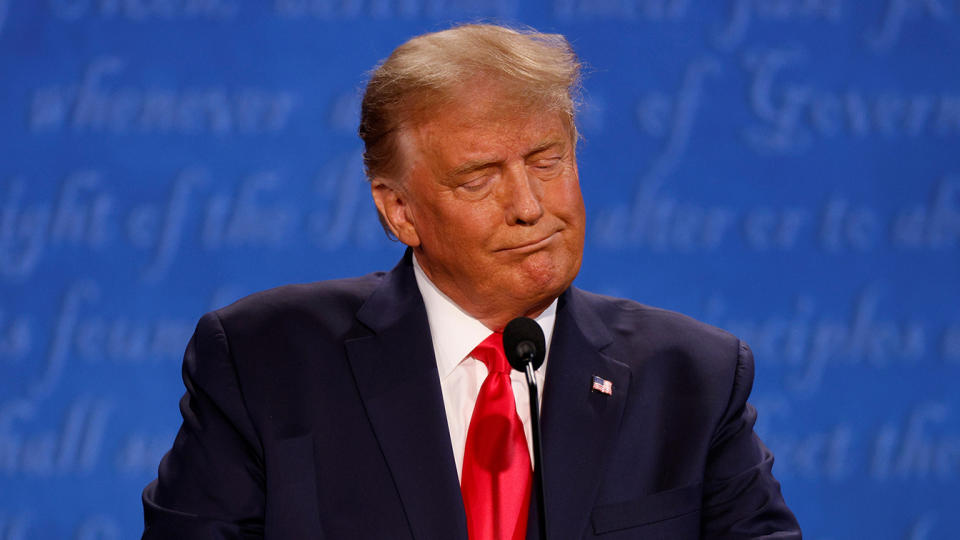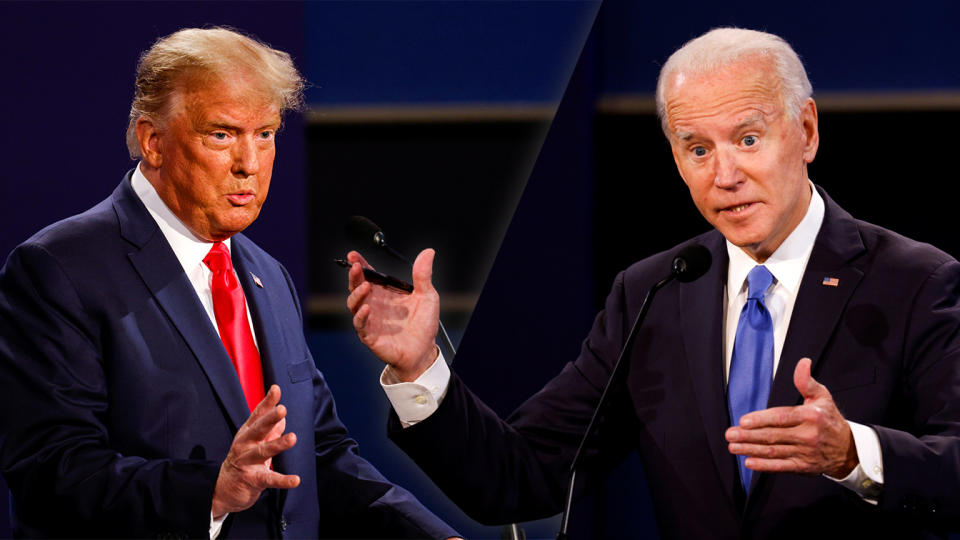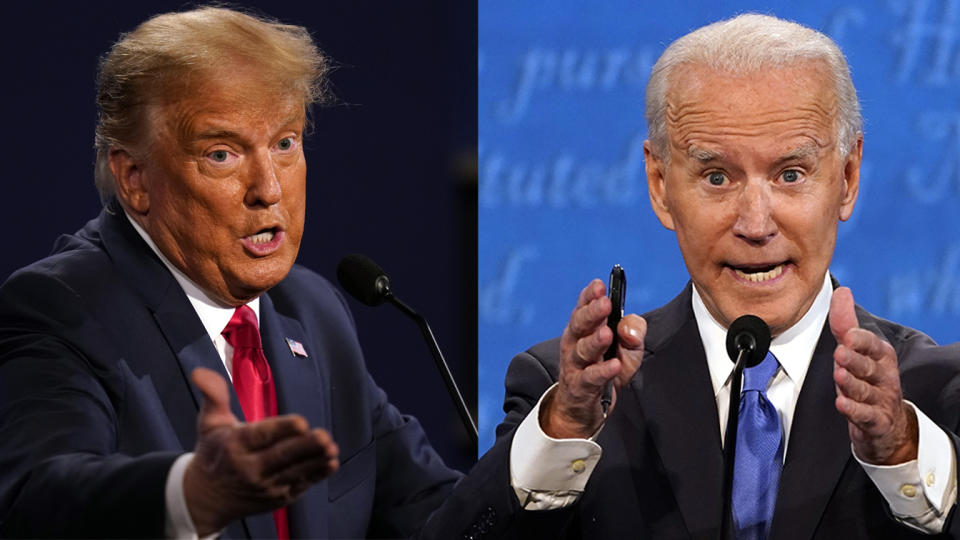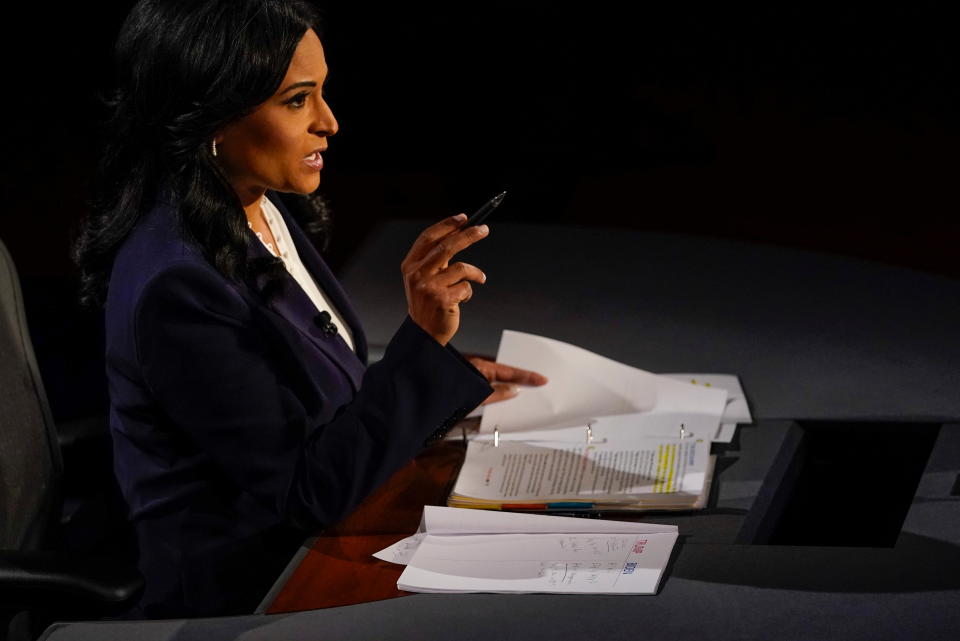4 takeaways from a less abrasive — but more revealing — debate between Trump and Biden
On Thursday evening, President Trump and former Vice President Joe Biden met in Nashville, Tenn., for the second — and final — socially distanced debate of the 2020 presidential campaign. They arrived with very different jobs to do.
Biden’s was the easier of the two. Ahead by an average of 9.9 percentage points in the national polls — and leading in enough swing-state surveys to present him with several possible paths to 270 electoral votes — the Democratic nominee simply needed to get through the encounter without committing the kind of dramatic error that could upend the contest at the eleventh hour.
Biden largely achieved his goal, emphasizing his core message that Trump has botched the United States’ response to COVID-19 and failed to help working-class Americans — even if the former vice president did have some shaky moments, as when Trump accused him of changing his position on banning hydraulic fracking, a hot-button issue in the swing state of Pennsylvania.
"Fracking on federal land, I said, no fracking and/or oil on federal land," Biden replied — a remark the Trump campaign immediately spliced into a web ad.
Trump, however, had the harder task. To come from behind and defeat Biden on Election Day, the president either needs the state polls to be off by a lot more than in 2016 — or he needs to shift the dynamic and win over some of the stubborn majority of voters who disapprove of his job performance. Thursday’s debate, which was watched by millions, was probably Trump’s last, best chance to trigger some sort of upheaval in a race that has remained remarkably static throughout a global pandemic, an economic collapse and a racial reckoning in the streets.
Despite staying somewhat on message and delivering his usual attacks on Biden as a creature of Washington who hasn’t achieved anything during his decades in office, Trump didn’t really seize the moment.
There are still a dozen days until the election. Some big event could still alter the outcome; the results could still surprise. But Thursday’s debate won’t be the thing that resets the race.
Regardless, the final clash between Trump and Biden was a fascinating glimpse into how differently the two candidates are approaching the final phase of the campaign — and how differently they would approach the presidency. Here are four takeaways from what transpired in Nashville:
Trump softens his approach — but struggles to nail his 'closing argument'

Pundits have made a lot of noise in recent days about the incoherence of the president’s so-called “closing argument” — the focused elevator pitch that candidates are supposed to deliver, ad nauseam, in the homestretch of a campaign.
In 2016, Trump repeatedly attacked Hillary Clinton as an untrustworthy, corrupt politician while portraying himself as a straight-talking outsider who would “drain the swamp” in Washington and fight for working people.
This time around, not so much. As one recent Washington Post summary put it, the president has just this month “called the Democratic vice-presidential nominee a ‘monster,’ retweeted images of a man being shot, suggested that Gold Star families may have infected him with the COVID-19, amplified a conspiracy theory questioning Osama bin Laden’s death, openly denigrated his own attorney general, attacked the nation’s leading infectious-disease expert, pulled out of a presidential debate, announced a complete withdrawal of troops from Afghanistan, called off talks for a stimulus package and restarted the talks calling for more spending than his party had embraced.”
Any undecided voter watching Thursday’s debate would have struggled to discern a clear, affirmative case for why Trump deserves a second term. Sure, the president did not attempt the kind of aggressive interruptions that lost him the first debate, according to pretty much every poll and even his own advisers, who privately urged him to tone it down this time. He pointedly avoided mentioning Biden’s son Hunter by name (after denigrating the younger Biden as a dishonorably discharged drug addict during the first debate); he politely let the moderator, NBC’s Kristen Welker, complete her questions, and praised her afterward for being “very professional.”
Yet the closest he came to a closing argument was his answer to the last question of the night, when he said, “We have to make our country totally successful, as it was prior to the plague coming in from China.” Back then, he claimed, “We had the best black unemployment numbers in the history of our country, Hispanic, Asian, women, people with diplomas, with no diplomas… Everybody had the best numbers.”
He went on to declare that “Success is going to bring us together, and we are on the road to success,” touting his tax and regulation cuts and claiming that Biden’s economic policies would create a “depression the likes of which you’ve never seen.”
This is the kind of optimistic, pocketbook appeal that might persuade a few reluctant Republicans to get back on board. The problem was that it came late in the debate, and was the only time Trump said anything like it.
For the preceding 90 minutes, he continued to force his 2016 Clinton playbook on Biden, vaguely alluding to convoluted and debunked claims about China, Moscow, Hunter and Ukraine, while repeatedly accusing Biden of being a “typical politician” who’s “all talk and no action.” At a time when Biden’s approval rating has already shown itself to be impervious to such attacks — and when many Americans are wondering why Trump himself didn’t do more to protect them from COVID-19 — recycling MAGA-rally applause lines probably isn’t going to move the needle.
"He's a very confused guy,” Biden said of Trump at one point. “He thinks he's running against somebody else.”
The empathy gap widens

Biden surrogates often make the case that empathy is the former vice president’s strongest point of contrast with Trump. Whatever Biden’s policies, they say — and his flaws — he cares about people like you.
Not surprisingly, Biden seemed determined to show off this side of his character Thursday night. What was surprising was how frequently Trump seemed to play into Biden’s hands.
One of the debate’s most striking split-screen moments came when Biden turned to the camera during a discussion of China. “There’s a reason he’s bringing up all this malarkey,” Biden said. “He doesn’t want to talk about the substantive issues. It’s not about his family and my family. It’s about your family. And your family is hurting badly… You’re sitting at the kitchen table this morning deciding, ‘Well, we can’t get new tires, they’re bald, because we have to wait another month or so.’ Or ‘Are we going to be able to pay the mortgage?’ Or “Who’s gonna tell her she can’t go back to community college?’ They’re the decisions you’re making in the middle-class families I grew up in in Scranton and Claymont. They’re in trouble… but that’s the last thing he wants to talk about. ”
Here, Trump, who had been squinting and smirking skeptically during Biden’s speech, interjected. “That’s a typical political statement,” he said. “‘Let’s get off the subject of China and talk about sitting around the kitchen table.’ Come on, Joe, you can do better than that.”
However canned you think your opponents lines are, mocking him for empathizing with the worries of middle-class Americans doesn’t tend to win over undecided voters.
Yet again and again, Trump went there. Welker noted, for instance, that lawyers tasked with locating immigrant families separated by the Trump administration have been unable to reach the parents of 545 children — and then asked how each candidate would reunite them. Trump’s response was to boast that the kids “are so well taken care of” because “they're in facilities that were so clean.”
Biden looked indignant. “Their kids were ripped from their arms and separated, and now they cannot find over 500 sets of those parents,” he snapped. “Those kids are alone. Nowhere to go, nowhere to go. It's criminal.”
When talk turned to COVID-19 relief, Trump bashed the House Democrats’ bill as “a big bailout for badly run Democratic cities and states” — giving Biden an easy opportunity to counter that he, for one, doesn’t “see red states and blue states.”
“Every state out there is in trouble,” he added.
Few voters expect empathy from Trump. But proudly displaying the opposite of empathy in the last big showdown before Election Day — and as a result, helping to highlight your rival’s favorite talking point in front of millions of voters — probably isn’t smart politics.
A 'dark winter' vs. 'It's going away' on COVID-19

COVID-19 continues to define the presidential contest, and predictably, it was the subject of Welker’s first question: How would each candidate propose to lead the country through this “dangerous new phase” of the pandemic, with cases soaring and hospitalizations peaking across much of the country?
Biden’s answer wasn’t particularly earth-shattering. He said, as he often does, that he will encourage everyone to wear a mask; that he will “move in the direction of rapid testing”; that he will create national standards for school reopenings; and that he will provide resources for small businesses to operate safely.
But his tone was uncharacteristically bleak. “We’re about to enter a dark winter, a dark winter, and [Trump] has no clear plan, and he has no prospects that there’s going to be a vaccine for the majority of the American people before the middle of next year,” the former vice president said.
“We’re about to lose 200,000 more people,” Biden added — a prediction that goes well beyond even the most dire epidemiological forecasts.
Trump, meanwhile, sounded positively sunny by comparison.
“There is a spike,” he admitted. But “There was a spike in Florida, and it’s now gone. There was a very big spike in Texas. It’s now gone. There was a very big spike in Arizona. It’s now gone. And there was some spikes and surges in other places. They will soon be gone… As I say, we’re rounding the turn. We’re rounding the corner. It’s going away.”
The president has often claimed that the pandemic will simply vanish — only to see it come back stronger. At this point, voters have probably grown accustomed to his dismissive attitude. With infections now rising yet again, however, the question is whether they want the next president to continue downplaying the severity of the virus — or whether they want someone to take it more seriously.
As Biden responded, “220,000 Americans dead — if you hear nothing else I say tonight, hear this: Anyone who is responsible for that many deaths should not remain as president of the United States of America.”
Welker impresses — even Trump

Chris Wallace’s turn as the moderator of this year’s first presidential debate was widely panned; the Fox anchor proved unable to keep Trump from interrupting Biden, or Biden from responding in kind. The result was perhaps the most unintelligible, juvenile debate in U.S. history.
Welker had some advantages over Wallace: several weeks to digest what went wrong during the first debate; a commission that had decided to silence each candidate’s microphone while the other was delivering his initial two-minute response; and a chastened president, who for his own strategic reasons had clearly decided to become more cooperative.
Still, Welker, 44, the first Black woman to moderate a general-election presidential debate since ABC’s Carole Simpson in 1992, presided over her debut with more poise and authority than many of her predecessors.
Earlier this week, Trump had called Welker “terrible” and accused her of bias, but even he was impressed.
“By the way, so far, I respect very much the way you’re handling this,” he said onstage.
Two things stood out. The first was the way Welker let each candidate make his case, to a point, but quickly seized the wheel whenever the dialogue threatened to careen off the rails — for example, when Trump swerved into unsubstantiated accusations about Biden’s siblings’ business dealings. “They’re like a vacuum cleaner,” Trump started to say. “They’re sucking up money.”
“OK, President Trump, thank you,” Welker said. “We do need to move on.”
As a result, voters got to hear enough from both candidates — but not too much.
The second standout moment was when Welker asked Biden and Trump about “the talk” — that is, if they understand why Black and brown families have to prepare their children for potentially hostile encounters with police because of the color of their skin.
Biden responded by referring to his social-worker daughter, who has studied the subject.
“I do [understand],” Biden said. “I never had to tell my daughter, if she’s pulled over: Put both hands on top of the wheel and don't reach for the glove box, because someone may shoot you. But a Black parent, no matter how wealthy or how poor they are, has to teach their child: Don’t have a hoodie on when you go across the street. Making sure that if you get pulled over, just ‘Yes, sir, no sir,’ hands on top of the wheel.”
Trump also said he understood, then immediately switched gears.
“Nobody has done more for the Black community than Donald Trump,” the president claimed. “If you look, with the exception of Abraham Lincoln — possible exception — but the exception of Abraham Lincoln, nobody has done what I’ve done. Criminal justice reform, Obama and Joe didn't do it. I don't even think they tried, because they had no chance at doing it.”
Both answers were revealing.
_____
Read more from Yahoo News:



